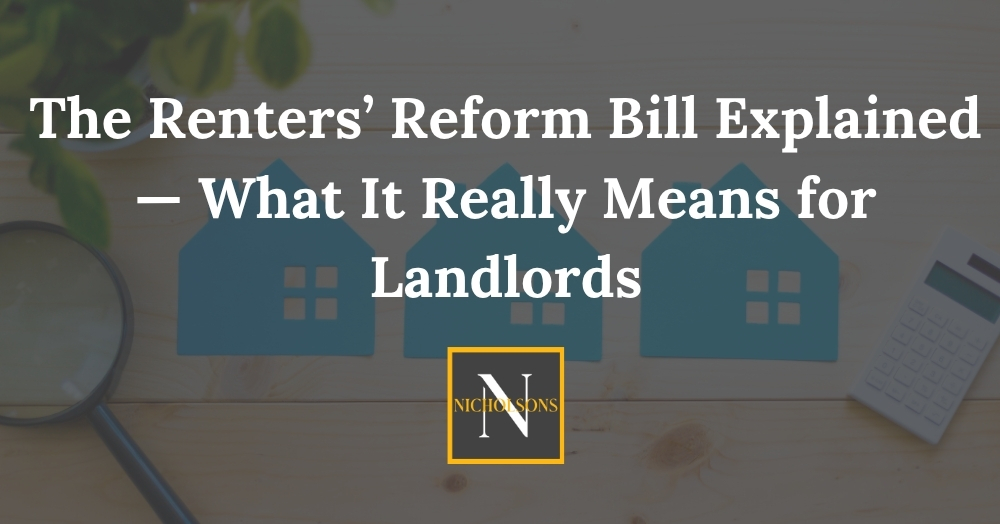It’s been talked about, debated, delayed, and reworked, but one thing’s certain: change is coming.
And for landlords, understanding what’s on the horizon isn’t just important — it’s essential.
At Nicholson’s Estate Agents, we work with landlords across Bassetlaw and Retford every day, and we know one thing for sure: staying informed is the key to staying compliant, confident, and successful.
So, what does this long-awaited Bill really mean for landlords? And how should you prepare?
Let’s break it down — clearly, calmly, and without the confusion.
⚖️ What Is the Renters’ Reform Bill?
The Renters’ Reform Bill is the government’s major plan to overhaul the way homes are rented in England.
Its goal is to make renting fairer and more secure for tenants, while raising standards and accountability for landlords.
In practice, it introduces several landmark changes — some positive, some challenging — that every landlord needs to understand.
❌ The End of Section 21 — “No-Fault” Evictions Are Going
One of the headline changes is the abolition of Section 21, often called the “no-fault eviction.”
Currently, Section 21 allows landlords to regain possession of their property without having to prove a tenant has done anything wrong, provided proper notice is given.
Under the new Bill, this right will be removed.
That means:
- Landlords will no longer be able to evict a tenant without providing a legitimate reason.
- Evictions will move to a strengthened Section 8 process, where clear grounds (such as rent arrears or property sale) must be shown.
While that might sound daunting, new grounds for possession are being added to make the system fairer to responsible landlords — such as wanting to sell or move back into the property.
🏡 A New Tenancy Structure — No More Fixed-Term Tenancies
The Bill also proposes the introduction of open-ended tenancies.
This means the traditional six or twelve-month fixed-term tenancy will disappear, replaced with a single, rolling tenancy model.
Tenants will be able to give two months’ notice at any time, while landlords can still regain possession through legitimate grounds.
The aim is to give renters more flexibility — but it also means landlords will need to plan ahead, stay organised, and keep their property management watertight.
🧾 A National Property Portal — Transparency for All
Another major update is the creation of a Property Portal, a central online database where landlords must register their properties.
This will:
- Help tenants check whether their landlord complies with legal standards.
- Allow local authorities to enforce regulations more effectively.
- Increase visibility and accountability across the private rented sector.
For professional and compliant landlords, this should be a welcome move — helping distinguish good landlords from those who cut corners.
🧯 Raising Standards and Accountability
The Bill will also bring in tougher enforcement on property standards, including:
- Strengthened Decent Homes Standards in the private sector.
- Greater focus on tackling damp, mould, and unsafe living conditions.
- More consistency in how local authorities deal with rogue landlords.
In short, it rewards landlords who already do things properly — and puts pressure on those who don’t.
💬 How This Affects Landlords in Retford and Bassetlaw
If you’re a landlord in Retford or the wider Bassetlaw area, you might be wondering how much this will really impact you.
The truth? It depends on how you manage your portfolio.
✅ If you’re already compliant, proactive, and transparent, you’re in a strong position.
❌ If you’ve relied on informal arrangements or skipped regular checks, it’s time to tighten things up.
At Nicholson’s, we’re already helping landlords adapt by reviewing tenancy agreements, updating processes, and ensuring properties meet every current and upcoming standard.
Because when the new rules arrive — you’ll want to be ready, not racing to catch up.
🔍 What You Should Do Now
To prepare for the Renters’ Reform Bill, landlords should:
- Review tenancy agreements — make sure they’re compliant and clear.
- Check property standards — especially for safety, damp, and insulation.
- Register documentation — keep EPCs, gas, and electrical certificates up to date.
- Communicate clearly with tenants — transparency builds trust.
- Seek professional guidance — an experienced letting agent can help you navigate these changes confidently.
💡 Our Take at Nicholson’s Estate Agents
Change can be unsettling — but it’s also an opportunity.
The Renters’ Reform Bill will reshape the lettings landscape, but with the right support, you can continue to thrive as a landlord.
Our lettings team at Nicholson’s is here to guide you through every step — from compliance checks to full management — ensuring you stay ahead of new legislation and continue to protect your investment.
Because being a landlord isn’t just about owning property — it’s about managing it with confidence, care, and compliance.
🏠 Stay Informed. Stay Protected. Stay Ahead.
If you’d like tailored advice or support managing your rental property under the upcoming reforms, get in touch with our expert lettings team today.
📍 Based in Retford, working across Bassetlaw and surrounding areas
📞 Call us on 01777 808777
🌐 nicholsonsestateagents.co.uk
At Nicholson’s, we don’t just let properties —
We protect landlords.





